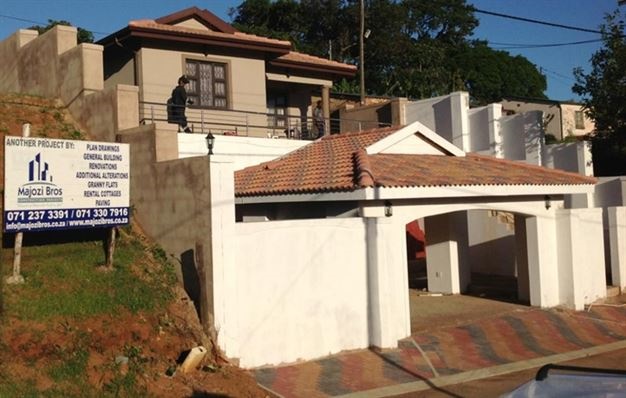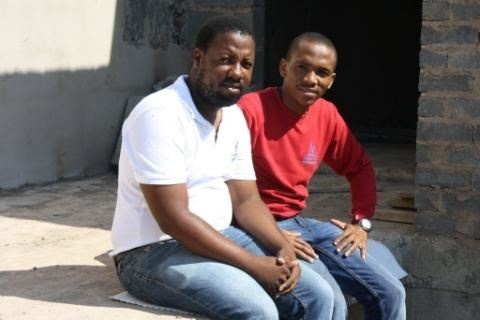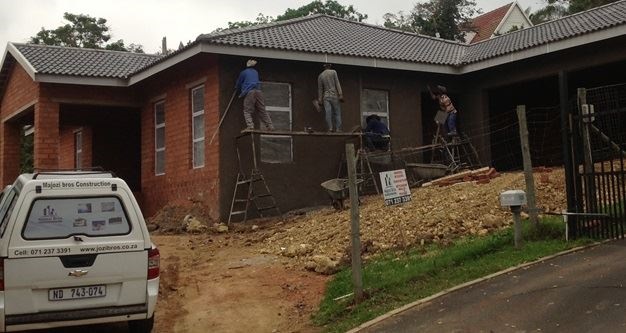One of the problems we faced was our age; people couldn't believe that being as young as we were that we could deliver on what we promised. To overcome that obstacle, we studied a lot of short building courses and we positioned ourselves in the market as experts. Unlike most building contractors in the market we didn't sell a price tag to our clients but rather we educated our potential customers as much as we possibly can so that they could make informed decisions.
We got written referrals from our happy clients and we insisted that our potential clients visit our current and completed projects so they can judge our capabilities first hand. We also developed a culture of under-promising but over-delivering.
When we got into the industry, the building industry and black building contractors in general had a very bad reputation, they were known for very poor workmanship and extremely high prices.
We decided to differentiate ourselves by establishing a strong brand in the market, one that was associated with quality workmanship. We joined quality assurance organisations such as NHBRC (National Home Builders Registration Council) and CIDB (Construction Industry Development Board). We made sure that our tradesmen were highly skilled artisans and that our foremen experienced in construction process and personnel management.
We invested heavily into branding and marketing - all our staff, including ourselves and our foremen wear branded uniforms. We made sure that our vehicles are branded and that all of our sites have branded sign boards with our details on it. We marketed ourselves extensively on the internet and also in newspapers and billboards.
We contracted the services of an accountant to help us manage and monitor costs and help us system up with financial controls. We also got our accountant to sit us down once a week and educate us about different aspects of financial management. We approached various experienced quantity surveyors and asked them to teach us how to effectively calculate quantities and costs. We also invested into costing software.
In the early days when we didn't have vehicles, we could get material to site on time, but not our workers and that resulted in a number of inefficiencies. This ultimately comprised our bottom line, because we weren't able to finish projects on time due to delays. Eventually we managed to buy a vehicle which lead to more vehicles and today we have a fleet of four vans.
You can have the best product/service on the market but it won't sell unless your customers know about it. And how you let you customers know that you exist is through marketing. When we started we had no marketing budget at all, we had to do with what little we had and be creative about it.
We posted free ads on different online platforms; we relied heavily on referrals so we had to produce top class workmanship for our existing clients to become somewhat of a sales team. We told everyone who was willing to listen about our business and what sets us apart from other businesses.
4. What sacrifices did you have to make as individuals to make your business a success?
We lost our social life and some friends as we both are workaholics. We are also both passionate to the extreme about our business and are always using whatever spare time we can get to strategise on the direction our business should take.
Simphiwe sacrificed the comfort of his stable job and I sacrificed an opportunity to get my university degree. We have sacrificed quality time with family.
At times we have sacrificed our money to the last cents to make our business work. Sometimes we were caught in situations where we l had to force breakthroughs because we literally had nothing to lose.
5. What did you learn the hard way as an entrepreneur?
Between the two of us we have over eight failed business ventures. The hardest lesson we had to learn as entrepreneurs was to be able to accept failure what it really is. Failing doesn't make someone a failure, failure is an opportunity, an opportunity to start again but more intelligently, there's more to learn from failure then there is to learn from success.
We are a product of the lessons we learnt from our failure hence we always make sure to turn our failure into positives no matter how severe they might seem at the time.
6. How helpful is your partnership for your business?
Being in this partnership is the best thing either of us could have done. No one in business has all the required skill sets to start and run a successful business. Simphiwe and I have strengths and weaknesses, my weaknesses are his strengths and his weaknesses are my strengths therefore we are able to bridge each other’s weaknesses.
Our partnership helps us come up with innovative ways of solving problems that we wouldn't have been able to come up with if we were individuals and it has helped us to bounce ideas of each other and give each other objective and unbiased feedback.
Our partnership is not perfect, we have our fair share of problems but our common vision and love for business is what keeps us together and makes us lethal as a pair.
7. How important is cash flow in your type of business? Do clients always pay on time, if not, how do you manage these to ensure the business does not suffer? Also, how do you pay your staff during such instances?
We learnt the hard way that cash is king. Most of our ventures failed due to a poor cash flow management. Inflows of cash need to exceed outflows, so we made a policy of getting payments prior a project and created payment schedules that ensure we are always ahead with payments verses the work.
At first we would have staff that would require money at anytime, any day and made up things such as transport money etc. We realised how this was messing up the cash flow, so we created payments for every second week of the month.
8. How important is a cash reserve fund/emergency fund for a business day? Does your business have one?
A cash reserve fund is paramount for any business especially in an industry as volatile as ours. Every business goes through a cycle of ups and downs.
We prepare for the downside by saving up reserves during the upward cycles and investing into property development when there is a slowdown. For instance, the industry as a whole is experiencing a downward cycle, but we have managed to buy some cheap pieces of land where we will create our own opportunities and build our own houses to sell.
By doing this we would also be able to keep some of our staff employed and grow our reserves during the low cycles of business.
We are firm believers in the notion that it is not about how much money you make, but it’s how you use it.
In conclusion
One of the ways we try to insure quality and that we grow as business and as entrepreneurs is to approach established construction companies. We don't ask them for BEE deals or handouts but we ask them to visit our sites and premises and to critique our construction processes and business model and suggest ways we can improve. The response has been phenomenal. Here's what some of them have had to say about us:
"I've met hundreds of guys since 1994 starting out like yourselves, I don't know what it is but there is just something different about you guys. I've got a good feeling about you" Greame Davis, CEO of G2 Construction, R250m company.
“You guys are the future of this industry, and that makes me confident about the future of this country" Rodney van der Walt, CEO of GCP, R350m company.
"I like you guys, I really like you guys, the passion you've shown me today will make you unstoppable" Craig Jessop, Director of WBHO, R14bn company.
"You guys will build an Empire, I honestly don't see anything stopping you" Andre du Plessis, Director of Liviero, R15bn.
"I don't have to see any of your sites but I know you guys can deliver, I've been in the game for 50 years, and when you've been in the game for as long as I have you get a feel for these things" Pieter Voogt, owner of Voogt, R700m company.
* Ndlela answered all the questions via email.
Consider yourself an entrepreneurial hero? Or just have something on your mind? Add your voice to our Small Business Centre:
* Write a guest post
* Share a personal story
* Ask the experts




 Publications
Publications
 Partners
Partners












